Lucas: “So you’re closing in. What did the guys look like?”
“Three of them were big guys, including the guy I shot. The fourth one was quite a bit smaller, he was the guy who got the car. Ten kilos is about twenty-two pounds, plus there was the weight of the buckets, or pipes, and these guys were climbing out of the boat onto the pier and running to the car carrying two buckets, so maybe . . . fifty pounds? They had to be a little strong.”
“Hair color, or anything like that?” Bob asked.
“The small guy had black hair, I want to say, maybe Latino. The other three guys look like these snowbirds we get down here in the winter, from New York and New Jersey. Kinda burned-looking. I don’t know about their hair, but on those guys, it’s usually black.”
Lucas: “Clothes?”
“Shorts, and you know, tropical-like shirts, like New York guys buy when they get down here. They go to a Tommy Bahama store, first thing. Get parrots on their shirts. Orange and bright yellow, neon stuff. Except the small guy, he was wearing black pants and a dark-colored shirt. Yeah. Dark-colored.”
Bob: “New York and New Jersey.”
Hall, who’d closed his eyes again, opened them now, and said, “Yeah. Those guys have a look. You see it all the time down here. Wraparound sunglasses, short hair, big guys, square faces, chewing gum, making it snap. They had the look.”
“The small guy . . . how small? Let’s say the other guys were six feet. How big was the small guy compared to them?”
“Oh, I don’t . . . Jeez, now that you ask it that way, about half their size,” Hall said. “Skinny. I don’t think he came up to their shoulders. I guess that’s why I’m thinking Latino.”
They talked a while about the recovery of the sunken Mako. The Coast Guard and Lauderdale cops sent divers down to recover what they could, before the remains of the boat were brought up with a crane. Among the recovered items were two scuba tanks, a badly burned buoyancy control vest, and other scuba gear.
“They found the diver’s wet suit, but it got melted into a lump,” Hall said. “I guess the guy peeled it off as soon as he got on board the Mako.”
“Any fishing gear on board?” Bob asked.
“Yes. They found rods and reels, ordinary stuff, cheap for a boat like that,” Hall said. “The FBI tried to trace it to a specific outlet, but . . . nothing came of it. There wasn’t much on board the boat. It’s like they used it for this one thing, and maybe fishing.”
“Maybe kept the personal stuff down to make it harder to identify them, if they got stopped and weren’t able to burn the boat,” Lucas said. “Even the fishing gear might have been stage dressing, so they’d look like they were doing something legitimate out there.”
“Don’t know about that,” Hall said.
They talked for a while longer, until Hall ran out of things to say. Bob asked, “You feel bad about shooting that guy?”
Hall shook his head. “Nope. They killed three of our guys. I thought maybe I would feel bad, but . . . you know, it’s back there in the past now. I don’t feel it much anymore. I don’t get all moody.”
“You’ll be okay, maybe you’re already okay,” Lucas said. “It’s a lot easier to live with killing somebody when you did the right thing and when good people agree that it was the right thing to do.”
“I think so,” Hall said. “My wife’s okay with it, and that helps. Then, I asked one of the FBI guys if they thought these dope guys might come after us, and he said these guys were just criminals, not the CIA. How would they even find us? We live in a trailer park, we don’t even have an address on our trailer, only on the mailbox out by the street.”
When they got up to go, Hall asked, “What’re you going to do now?”
Lucas said, “The FBI has identified some people that might know something, even if they don’t know much. We’ll find them, step on their toes. See what they have to say.”
“Good. I want them caught. Our guys never had a chance, they just mowed them down.”
“We’ll get them,” Bob said.
“Listen, long as you’re here, you oughta go look at the boat show, if you haven’t seen it yet,” Hall said as they walked back to the equipment-sales pavilion. “I live down here and I’ve been every year for the last four. Can’t get enough of it.”
Hall went back to work and Lucas and Bob spent an hour wandering through the maze of docks, looking at the boats. The megayachts had garage-door type openings on their sterns, open so passersby could have a look. Nestled inside one was a submarine; another had a “skiff” that was twice as big as Lucas’s fishing boat; in a third, five women danced and lip-synced to a Rihanna song, like fake-blond Supremes.
Bob: “Wonder if the women come with the boat?”
“Wouldn’t be surprised if it was an option,” Lucas said.
One of the yachts had fuel tanks with a forty-thousand-gallon capacity. At Lauderdale prices, a single fill-up would cost a hundred and sixty thousand dollars, another gawker told them.
Lucas: “I’m a long way from being a commie, but . . . I mean, Jesus H. Christ. A hundred and sixty thousand for one fuckin’ fill-up?”
As they walked back to the car, three fruit-colored Lamborghinis—banana, cherry, and green apple—lurched by, one after the other. Average traffic speed was perhaps a mile an hour.
“That was nice,” Bob said. “Now, where do we find the guys whose toes we’re going to step on?”
“We need to talk to Weaver some more, without all the other people around,” Lucas said, referring to the head of the task force. “I don’t want a lot of . . . you know . . . pushback from the Millennials.”
“You’re going to get us in trouble, aren’t you?”
“Bob: you gotta relax, man. They’re just a bunch of feds.”
Weaver was sitting at the hotel bar, talking to the bartender when they showed up. He tipped his gin-and-tonic glass at them and said, “Tonic water and lime, no gin.”
Bob: “That sounds good.” He asked the bartender for the same thing; Lucas ordered a Diet Coke.
“You boys ain’t gonna bring Lauderdale to its knees, are you?” the bartender asked, as he went to get the drinks. When they came, the three of them took the drinks to a table and Weaver asked, “Anything new? I’m praying you’ll say yes.”
Lucas said, “No new information, but some new thoughts, maybe.”
“I’ll take anything.”
“Where’s the stuff recovered from the yacht? I understand you found a wet suit.”
“Locked up in an evidence room down in Miami,” Weaver said. “But the wet suit . . . it’s a lump of melted neoprene. No way to get anything from it.”
“Did anyone weigh it?”
Weaver hunched his shoulders. “I don’t know, honestly. I doubt it. I could ask.”
“Could you ask, and if they haven’t, get them to do it?” Lucas asked. “Quick as they can?”
“Sure, I can do that.”
Lucas: “Another thing. When Barney Hall shot the guy, you immediately went around and jacked up a couple of dozen people based on their relationships with the dead man. Were any of those guys dealing dope?”
Weaver shook his head: “Not as far as we know. I’m sure some were users, but it wasn’t their big thing. Most of them worked in bars or marinas, or lifting heavy stuff. We’re not talking about business geniuses. Dealing? Nothing big-time, if they did it at all.”
“What about the meeting with the narcs?” Lucas asked.
“You’re set to go at three o’clock.”
“That’s great.”
“No problem. It’s nice to have you guys hustling,” Weaver said. “The rest of us have slacked off, I’m afraid. Been a frustrating investigation, banging our heads against brick walls.”
Читать дальше
![Джон Сэндфорд Ocean Prey [calibre] обложка книги](/books/384313/dzhon-sendford-ocean-prey-calibre-cover.webp)
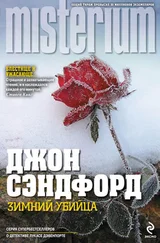


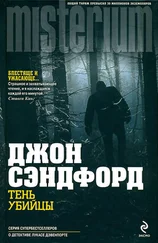
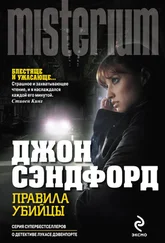
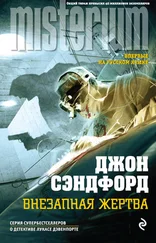
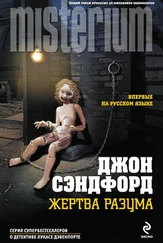



![Джон Ирвинг - Viename asmenyje [calibre]](/books/384315/dzhon-irving-viename-asmenyje-calibre-thumb.webp)
![Джон Ирвинг - Vandens metodas [calibre]](/books/384316/dzhon-irving-vandens-metodas-calibre-thumb.webp)